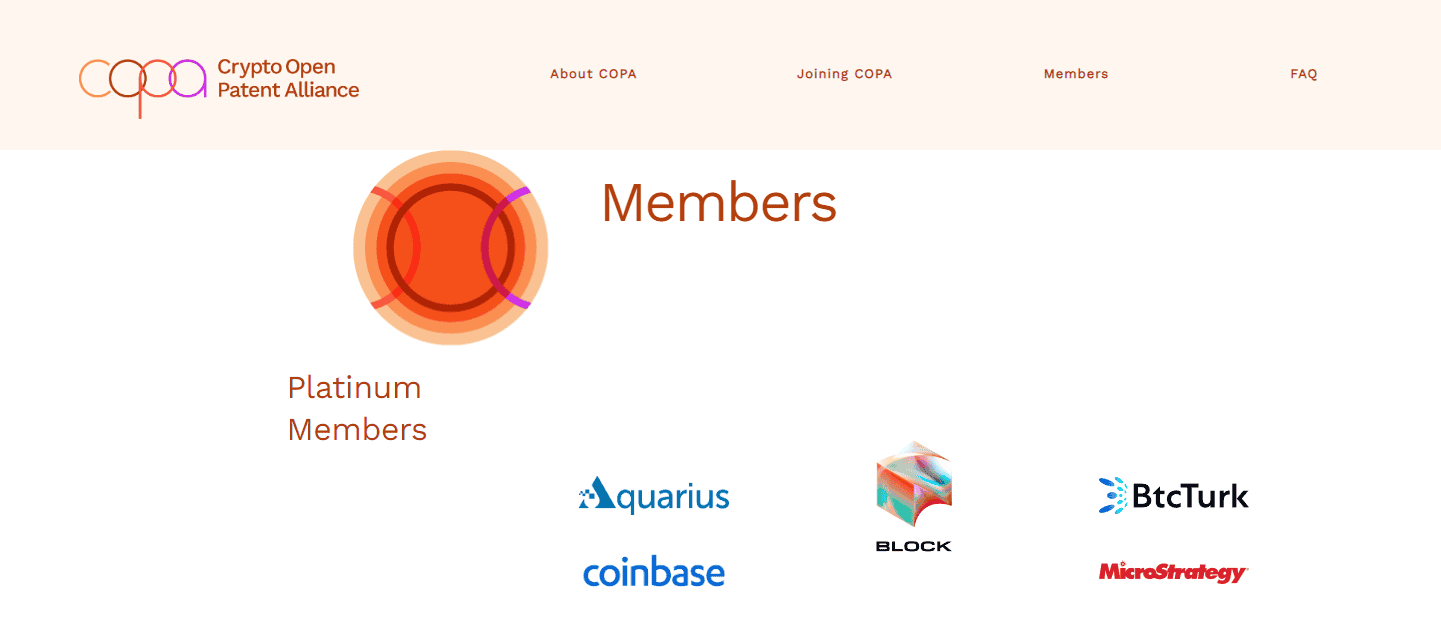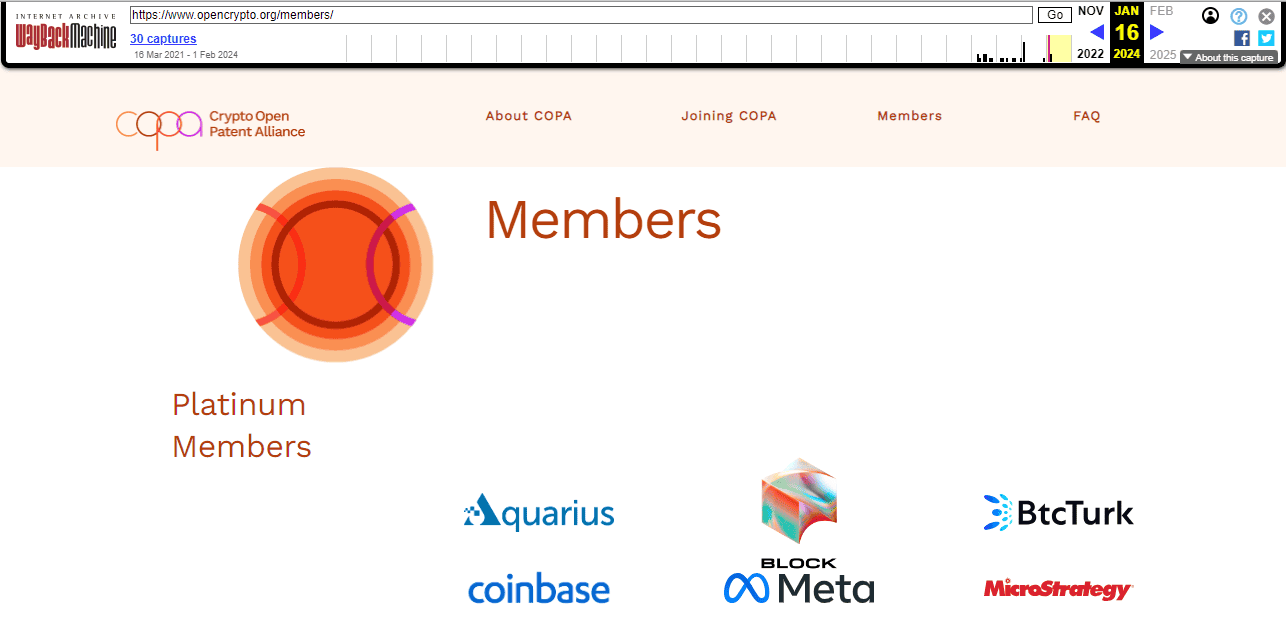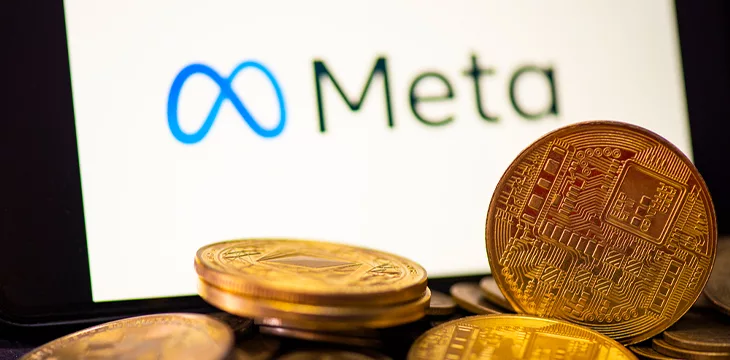|
Getting your Trinity Audio player ready...
|
Just a week after Dr. Craig S. Wright made a formal offer to settle his legal dispute with the Crypto Open Patent Alliance (COPA), the name Meta and its logo have mysteriously disappeared from COPA’s members page. COPA’s trial against Dr. Wright, challenging his copyright claim to the 2008 Bitcoin white paper, is due to start on 5th February.
Meta (NASDAQ: META), parent company of Facebook, has not publicly announced its departure from the organization, nor are there any reasons for the logo’s disappearance outside of speculation. An archived version of COPA’s members page shows the Meta name/logo present as recently as January 16th 2024. COPA itself has not commented on Meta’s absence.


However if Meta has indeed left COPA, or even if it simply wishes to obscure its association with the group, the timing is curious. The Members page change was noticed just a week after COPA soundly rejected Dr. Wright’s settlement offer. Was COPA too hasty in its public dismissal of it, without giving Meta’s lawyers enough time to consider?
COPA’s FAQ page states: “Each COPA member will be required to be a member for 3 years before becoming eligible to voluntarily withdraw. A member can withdraw voluntarily by submitting a written notice to COPA. After a member withdraws, they will no longer have access or the ability to use patents from the Shared Patent Library. Any foundational crypto patents the withdrawing member had prior to and during their membership in COPA will continue to be subject to the Patent Pledge even after they leave COPA, but any patents they file for after their withdrawal will not be subject to the Patent Pledge. “
What was Craig Wright offering?
On January 24, 2024, Dr. Wright made a pre-trial settlement offer that was valid until January 31, 2024. If accepted, it would have seen him waive his database rights and copyrights relating to BTC, BCH, and ABC. It also contained an offer of an irrevocable license in perpetuity to parties operating those databases, which would have enabled them to “compete fairly, in parallel with BSV.” He noted that he wants to “continue to be a force for good” and align with a portion of COPA’s own Mission Statement, “to encourage the adoption and advancement of cryptocurrency technologies.”. He also agreed to donate any income from the settlement to charity, to prove there was no profit-driven motive behind his own legal claims.
In return, the plaintiffs (COPA) would: discontinue their legal claim before trial, with respective parties bearing their own accumulated costs; make a donation to an agreed-upon charity, and cease all media campaigns against Dr. Wright. COPA members would also confirm a statement agreeing that Satoshi Nakamoto’s original vision for Bitcoin was on-chain scaling and “small casual transactions” otherwise known as micro-payments and recognize that BTC, BCH and ABC “now have separate purposes and uses not contemplated by Satoshi Nakamoto.”
Within hours after Dr. Wright made his offer, COPA gave it a “hard pass”:
Hard pass on that "settlement."
Just like Craig Wright forges documents and doesn't quite tell the truth, his description of the settlement offer isn't quite accurate either – it comes with loopholes that would allow him to sue people all over again.
— COPA (@opencryptoorg) January 24, 2024
Few expected COPA and its members to accept the offer. Regardless of acceptance or rejection, the offer carried the implication that Dr. Wright was not trying to harass open source developers or stifle Bitcoin-related work, and was merely attempting to protect his personal reputation and the original vision for his creation. Proceeding with the trial could confirm speculation that COPA’s true motive was to discredit Wright and attack his claims to have been Satoshi Nakamoto, not to keep crypto IP free and open.
A recent op-ed published on COPA’s behalf by Coinbase Chief Legal Officer Paul Grewal added more weight to this viewpoint by attacking Dr. Wright’s personal reputation. The piece, titled “Time to end Craig Wright’s harassment campaign against Bitcoin devs,” referred to Wright as a “bully” whose “endless stream of baseless litigations” are based on “lies” and “delusions of grandeur.”
“COPA filed its own case and asked a court to declare once and for all that Craig Wright is not Satoshi,” he wrote.
Meta and the COPA club
Meta joined the Crypto Open Patent Alliance at the end of 2021, just over two years ago, and months after COPA filed its lawsuit against Dr. Wright in April that year. The addition added a lot of mainstream business prestige to the organization, especially since the five other names on its “Platinum Members” list are Aquarius, Coinbase (NASDAQ: COIN), Block (formerly Square), BtcTurk and Michael Saylor’s Microstrategy (NASDAQ: MSTR).
COPA General Manager Max Sills said in January 2022 that Meta would be the organization’s largest patent holder, and its portfolio “includes all Meta’s core crypto technology patents.”
COPA itself was first announced in 2020, and has a stated dual purpose of sharing crypto-related innovation openly, and protecting its members from IP infringement claims it considers false or fraudulent. Such claims stifle development, drain scarce funds, and add undue stress to the lives of independent developers who lack the resources to combat those claims, its representatives have said.
COPA’s FAQ page gives the reasons as such:
“The success of cryptocurrency depends on the community coming together to build and develop upon existing technologies to innovate, which is not possible when parties tie up the technologies in patents and litigation.”
It’s highly likely COPA was founded as a direct response to Dr. Wright’s Bitcoin-related legal claims, especially since its lawsuit against Dr. Wright remains the organization’s only major action in its history.
COPA members must make a “legally binding and enforceable” Patent Pledge, a legally-declared agreement not to sue anyone (except “in defense of the community”) and to provide “a license to their foundational cryptocurrency patents to anyone who develops cryptocurrency products.”
The group’s claims about making blockchain-related IP open for all developers ring hollow when you notice COPA’s shared patent library is available only to its official members, and it devotes a large proportion of its time and energy targeting one individual, Dr. Wright. Even on social media its content is sparse: COPA has posted a total of 10 times since 2021; five of those (including its very first) are accusations against or references to Craig Wright, while and the rest are membership announcements. Perhaps some of its legal expertise and stated idealism could produce some educational material, e.g., neutral articles on the importance of open access to IP; whether or not inventors should make their work freely available to all and for any purpose; or what an inventor should do when someone uses their work for purposes to which they’re opposed… just a thought.

 07-13-2025
07-13-2025 





